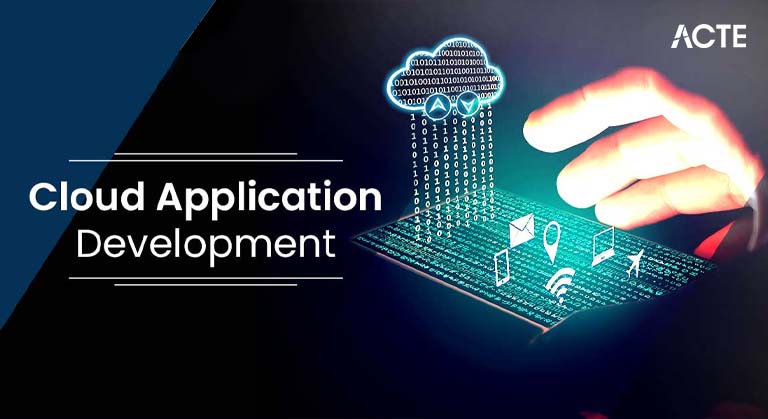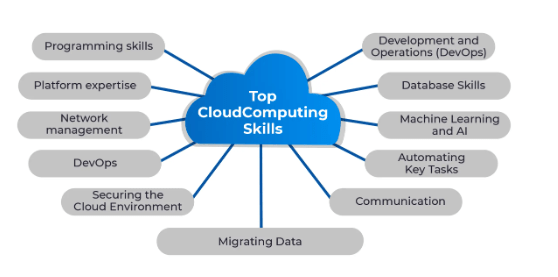
- What is a Cloud Developer?
- Key Skills Required for Cloud Development
- Programming Languages for Cloud Development
- Choosing the Right Cloud Platform (AWS, Azure, GCP)
- Understanding Cloud Deployment Models
- Cloud Application Development Tools
- Security Best Practices for Cloud Development
- Certifications for Cloud Developers
- Hands-on Cloud Development Projects
- Career Opportunities in Cloud Development
- Future Trends in Cloud Development
What is a Cloud Developer?
A Cloud Developer is a software developer specializing in building applications, services, and systems deployed and managed in cloud environments. These developers design, implement, and maintain cloud-based applications, ensuring they are scalable, reliable, and secure. Cloud developers often work with cloud computing services from Amazon Web Services (AWS), Microsoft Azure, and Google Cloud Platform (GCP). They are responsible for developing cloud-native applications and leveraging the full range of cloud features, such as computing power, storage, databases, and networking. Cloud development has grown significantly due to businesses’ increasing adoption of cloud computing to improve flexibility, reduce costs, and enhance performance. As more organizations migrate to the cloud, cloud developers are in high demand to ensure seamless operation and performance of cloud-based systems.
Key Skills Required for Cloud Development
Cloud developers require a combination of technical and soft skills to be successful in their role. Some key skills include:
- Cloud Computing Fundamentals: Understanding the core principles of cloud computing, such as elasticity, scalability, availability, and multi-tenancy. Cloud developers should also be familiar with the major cloud service models, including Infrastructure as a Service (IaaS), Platform as a Service (PaaS), and Software as a Service (SaaS).
- Cloud Service Provider Knowledge: Expertise using cloud platforms like AWS, Azure, or Google Cloud Platform is essential. Cloud developers should be proficient in working with these platforms’ specific tools and services, such as AWS Lambda, Azure Functions, or Google Cloud Functions.
- Programming Skills: Cloud development requires a strong understanding of programming languages for building cloud-native applications. Common languages include Python, Java, C#, JavaScript (Node.js), and Go. These languages are used to write serverless functions, build microservices, and develop applications.
- Containerization and Microservices: Familiarity with Docker and Kubernetes is increasingly essential for cloud developers. They need to be able to package applications in containers and deploy them using Kubernetes or other container orchestration tools.
- DevOps Practices: Cloud developers often work closely with DevOps teams to automate application deployment, monitoring, and scaling. Understanding Continuous Integration (CI), Continuous Deployment (CD), and Infrastructure as Code (IaC) is essential for building efficient and automated workflows.
- Database Knowledge: Proficiency in relational (SQL) and non-relational (NoSQL) databases is crucial. Developers should know how to work with Amazon RDS, Azure SQL Database, or Google Cloud Functions.
- Security Best Practices: Programming Languages is vital to understand how to secure cloud applications. Cloud developers should be well-versed in using encryption, identity and access management (IAM), authentication, and authorization mechanisms to protect cloud applications.
- API Development and Integration: Many cloud applications rely on APIs for communication. Cloud developers should be proficient in building and consuming RESTful APIs and integrating third-party services via APIs.
- Networking Knowledge: Cloud developers must understand how cloud networking works (including VPCs, subnets, load balancers, firewalls, etc.) to ensure applications are properly integrated with cloud resources.
- Problem Solving and Analytical Thinking:Cloud developers must be able to troubleshoot issues, optimize performance, and ensure scalability. Analytical thinking is key to identifying the root causes of problems and implementing solutions.

Programming Languages for Cloud Development
Cloud developers often use several programming languages to develop applications, services, and functions that run on cloud platforms. Some of the most commonly used languages in cloud development include Python Popular for developing serverless functions and microservices in the cloud. It’s also widely used in data science, AI, and machine learning applications.Java A common language for building enterprise applications that run in the cloud. Java is supported by most cloud platforms and is used for backend systems, large-scale applications, and APIs.JavaScript/Node.js Used for building both frontend and backend cloud applications. Node.js allows cloud developers to create scalable applications that handle many simultaneous requests.C# Often used for cloud development in Microsoft Azure environments. C# is widely used to build .NET applications and microservices that run on Azure.Go Known for its speed and efficiency, Go is increasingly popular in cloud environments, especially for building microservices and containerized applications.Ruby While not as common as Python or JavaScript, Ruby is still used by some developers for cloud-based applications, particularly for web development.PHP Common for web development and often used in cloud-based content management systems (CMS) and e-commerce platforms.
Choosing the Right Cloud Platform (AWS, Azure, GCP)
- Choosing the right cloud platform depends on several factors, including the organization’s existing Infrastructure, team expertise, and the specific use case of the application.
- Amazon Web Services is the largest and most widely used cloud platform, offering a vast range of services for computing, storage, networking, machine learning, and more. Amazon Web Services is highly flexible and can be used for various workloads, including enterprise, web, and serverless applications.
- Microsoft Azure is known for its seamless integration with Microsoft services and products, making it a preferred choice for organizations already using Windows Server, Active Directory, and other Microsoft tools. It also provides extensive PaaS and SaaS offerings, which are great for developing cloud-based applications.
- Google Cloud Platform is influential in data analytics, machine learning, and containerized application development. It is widely used by organizations with heavy workloads related to big data, artificial intelligence, and Kubernetes-based microservices.
- Each cloud platform has strengths, and the choice largely depends on an organization’s existing technology stack, its cloud strategy, and the project’s specific needs.
Understanding Cloud Deployment Models
Cloud developers must understand the different deployment models that determine how applications are hosted and managed in the cloud:Public Cloud: In a public cloud, resources are owned and operated by a cloud provider and shared by multiple tenants. Services like AWS, Azure, and Google Cloud Platform provide scalable and cost-efficient options for developers to build and deploy applications.Private Cloud is used exclusively by one organization, either on-premises or hosted by a third-party provider. It provides more control and security, ideal for sensitive data or compliance-heavy industries.Hybrid Cloud cloud combines public and private cloud infrastructures, allowing data and applications to move between them. Developers need to design applications that can operate seamlessly across both environments.

Cloud Application Development Tools
Several tools and services are available to aid cloud developers in building and managing cloud applications. Some popular ones include:
- AWS CloudFormation / Azure Resource Manager:These tools allow developers to define and manage cloud resources declaratively using Infrastructure as Code (IaC).
- Docker and Kubernetes: They are essential for developing, packaging, and deploying containerized applications. Kubernetes is a powerful tool for orchestrating containers in a cloud environment.
- AWS Lambda / Azure Functions / Google Cloud Functions: These are serverless computing services that allow developers to run code without managing servers, ideal for event-driven applications.
- CI/CD Tools: Tools like Jenkins, GitLab CI, AWS CodePipeline, and Azure DevOps automate the building, testing, and deployment of cloud applications.
- Cloud Databases: Managed database services like Amazon RDS, Azure SQL Database, and Google Cloud Functions enable developers to focus on application development without managing the underlying database infrastructure.
- Monitoring and Logging Tools: Services such as Amazon Web Services CloudWatch, Azure Monitor, and Google Cloud Operations Suite help developers monitor application health and performance.
Security Best Practices for Cloud Development
Security is a top concern in cloud development, and cloud developers should adhere to best practices, Use Strong Authentication To restrict access to cloud resources, implement identity and access management (IAM) and multi-factor authentication (MFA).Data Encryption Encrypt data both in transit and at rest to protect sensitive information.Secure APIs To protect data accessed through APIs, use secure methods for API authentication, such as OAuth, API keys, and encryption.Implement Security Groups and Firewall To protect cloud resources, configure security groups, network ACLs, and firewalls to control inbound and outbound traffic.Regular Audits and Monitoring Continuously monitor cloud environments for vulnerabilities and implement regular audits to meet security standards.
Certifications for Cloud Developers
Cloud certifications help demonstrate your expertise and increase your job prospects as a cloud developer. Some popular certifications include:
- AWS Certified Developer Associate:Validates skills in developing and deploying cloud-based applications on AWS.
- Microsoft Certified: A certification that demonstrates proficiency in developing applications on Microsoft Azure.
- Google Cloud Professional Cloud Developer: Validates skills in developing applications and services on Google Cloud Functions.
- Certified Kubernetes Application Developer (CKAD):This certification focuses on developing and deploying Kubernetes applications that are widely used in cloud environments.
Hands-on Cloud Development Projects
Working on hands-on cloud development projects is critical to enhance your skills and showcase your ability. Projects could include:
- Building a serverless application using AWS Lambda or Azure Functions.
- Developing a microservices architecture with Kubernetes.
- Creating a cloud-based data pipeline using AWS or Google Cloud Platform data services.
- Automating deployment pipelines using CI/CD tools like Jenkins or AWS CodePipeline.
Career Opportunities in Cloud Development
Cloud development offers a variety of career paths, including, Cloud Developer: Focused on developing applications and services in the cloud.Cloud Architect: Designs and implements cloud infrastructure and application solutions.Cloud Engineer: Manages and optimizes cloud resources, ensuring their proper functioning.DevOps Engineer: Works on automating cloud infrastructure and managing CI/CD pipelines.Cloud Security Specialist: Focuses on securing cloud environments and ensuring compliance.The salary of a cloud developer varies depending on factors like experience, certifications, and location. Salaries may vary based on industry, cloud platform expertise, and region.On average, cloud developers can expect the following wage
- Entry-level: $80,000–$100,000 per year
- Mid-level: $100,000–$130,000 per year
- Senior-level: $130,000–$160,000 per year
Future Trends in Cloud Development
The future of cloud development is promising, with key trends including, Serverless Computing architectures will continue to gain popularity due to their simplicity and cost-effectiveness.AI and Machine Learning Integration Cloud developers will increasingly integrate AI and ML models into applications. Edge Computing As the IoT expands, cloud development will focus on processing data closer to the source, reducing latency. Multi-cloud Strategies Companies will adopt multi-cloud environments, requiring developers to design solutions across various platforms.Automation and DevOps More automation will be integrated into cloud development processes, enabling faster and more reliable deployments.The field of cloud development is rapidly evolving, and developers must stay up-to-date with the latest tools, platforms, and practices to remain competitive in the industry.





